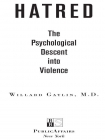Hatred by Willard Gaylin (best manga ereader txt) 📗

- Author: Willard Gaylin
Book online «Hatred by Willard Gaylin (best manga ereader txt) 📗». Author Willard Gaylin
Proximal identification can never be extended to include the entire human race. Its biological purpose is exactly the opposite. We serve the species by overvaluing that small section of it for which we are responsible. Yearning for a true “brotherhood of man” is hopeless. There is no psychological way to extend our downward identification to all. It is too heavy a burden. Were each of us to grieve over the suffering of every child in the same way as we do with our own, life would be unendurable. Just as the surgeon must protect himself from the suffering of his patients to facilitate his professional role, we cannot mourn in the truest sense over every tragedy in the daily paper. We are touched and empathic, and that is the most we can expect. That is also the least we should expect of ourselves. We cannot tolerate total indifference.
But what if, beyond indifference, we take delight? We have then moved from the relative indifference that we maintain toward the other and into the area of hatred that we reserve for our enemies. Hatred is an extreme and perverse distortion of the necessary process of group identification. The entire process of identity and identification involves not just locating ourselves but also locating others. It is a method of separation as well as identification. If there is a “me,” then there is a “not-me,” which will eventually be further identified as things and other people. If there exists a group of people with whom I identify and with whom I share a common fate, there must be others with whom I do not identify.
To say that I do not identify with some group is still short of wishing its members ill. It may simply mean that I have no emotional investment in them, no primary concern for them, and little empathy for them. It is a form of prejudice to exclude a whole population from our moral sensibilities, but it is well short of hatred. When I said that the opposite of both love and hate is indifference, it is to this lack of identification that I referred.
This exclusion from identity explains the relative indifference that exists in the more developed countries to the suffering in the less developed world. Even the compassionate vocation of medicine has neglected the search for treatments for crippling diseases that are endemic to alien environments. Schistosomiasis and filariasis, parasitic diseases of the tropics, commanded relatively little research, considering the tragic suffering they cause, when compared with the search for the cures for common allergies. It is not just that there is less money to be made—although that is the primary driver of pharmacological research—but that in general these areas are simply less visible to most of us. We don’t hate these people. They just don’t command our attention.
Certainly there is a bias here. The people affected do not have a strong moral claim on us. They are not members of our community. And while I am hopeful that we can eventually become more inclusive and expand the community of the us, I am well aware that the nature of proximal identification will always place people on a continuum of closeness to our hearts. Still, such indifference begins the process that makes the other not just different from, but less than, us. Indifference and bias are dangerous because they are natural way stations on the road to enmity. Locating an alien other encourages and unleashes the forces of hatred that lie dormant in the biased individual.
11
IDENTIFYING THE ENEMY
Indifference in the face of evil is in itself a moral wrong, but it is still not the active engagement that defines hatred. We must perceive the other as a danger, an enemy, in order to begin to hate him. But more important, we must have an internal conflict for which the location of an enemy will supply some resolution and relief. A sense of personal worthlessness, helplessness, and despair characterize a diminished and desperate individual. Such a population is the soil in which the seeds of hatred may be sown.
There have been beaten down and deprived populations that have passively endured without hatred for centuries. Their condition was accepted by them as an existential fact of life, not a humiliation imposed from above. Indeed, when supported by religion, the impoverished life may be viewed as a key to the kingdom of heaven. “And again I say unto you, It is easier for a camel to go through the eye of a needle, than for a rich man to enter into the kingdom of God.”54
Only when we feel that we have actively been deprived—or sense that we have been denied that to which we are entitled—will we seek some external cause of our adversity. When the cause is perceived as within our nature, our own fault, we despair; if the cause is perceived as imposed from outside, we are ripe for hatred. The change from despair to feeling humiliated and exploited involves shifting responsibility from the self to others. It requires identifying an enemy. When the other is indeed the oppressor, a revolutionary rage (a righteous anger) may be liberated. But more often that not, a scapegoat population is targeted, one that bears no responsibility for the perceived or real injuries. This scapegoating is the paranoid mechanism behind





Comments (0)